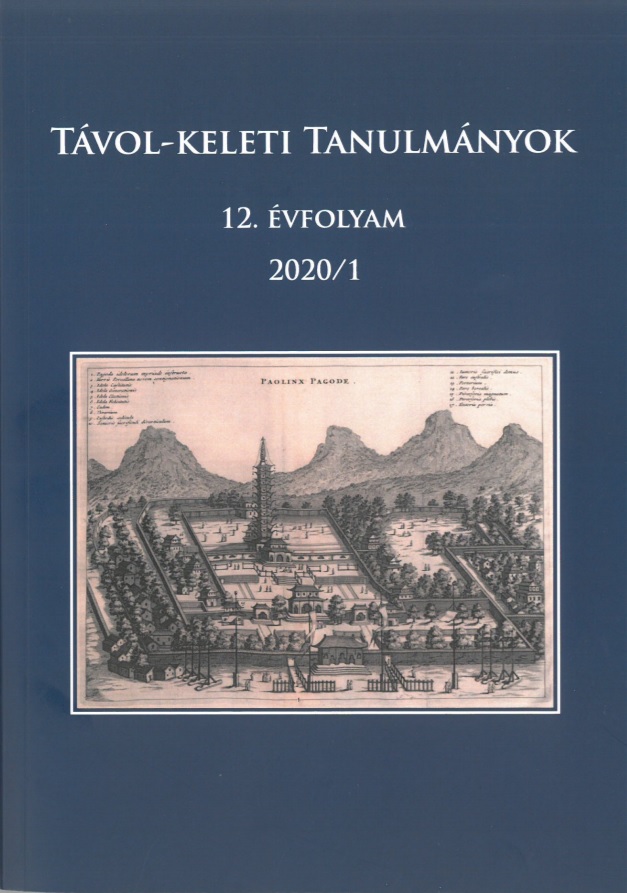„Méltán nevezhetni chinai Homérnak”: A Dalok könyvével (Si king) kapcsolatos magyar nyelvű ismeretek és fordítások első évszázada I. rész
Megjelent 2021-02-25
Kulcsszavak
- Kína,
- Kína-kép,
- Dalok könyve,
- irodalom,
- XIX. század
Hogyan kell idézni
Copyright (c) 2021 a szerző(k)

This work is licensed under a Creative Commons Attribution-NonCommercial 4.0 International License.
Absztrakt
Az ókori kínai dalgyűjtemény, a Dalok könyve – mint a konfuciánus kánon része – a XVIII. századtól kezdve vált ismertté Európában. Mivel a XX. század közepéig nem akadt tudományos felkészültséggel és kínai nyelvtudással is rendelkező magyar orientalista, a kezdetben a Kínáról szóló információkat közvetítő nyelveken (német, angol, francia) keresztül interpretálva váltak elérhetővé a nagyközönség számára. A tanulmány jelentősége abban áll, hogy számos olyan, eddig rejtőzködő forrást tár fel, amelyek gazdagítják a XIX. századi magyar nyelvű ismeretanyag tárházát Kínával és a kínai kultúrával kapcsolatban. Ezek közül is különösen értékesek azok a források, amelyek a kínai versek első magyar nyelvű fordításait, műfordításait képviselik. A tanulmány első részében a Dalok könyvével kapcsolatos ismeretek, recepciók és legkorábbi fordítások olvashatók a XIX. század elejétől 1878-ig.
Hivatkozások
- Allen, Clement Francis Romilly 1891. The Book of Chinese Poetry being The Collections of Ballads, Sagas, Hymns and other pieces know as The Shih Ching or Classic of Poetry. London.
- Arany László (szerk.) 1888. Arany János hátrahagyott iratai és levelezése. I. köt. Versek. Hátrahagyott versei. Budapest: Ráth Mór.
- Cramer, Johann 1844. Schi-King, oder Chinesische Lieder, gesammelt von Confucius. Neu und frei nach P. La Charme’s latinischer Uebertragung bearbeiter. Für’s deutsche Volk herausgegeben von Johann Cramer. Creferd: Funckle.
- Csibra Zsuzsanna 2006. Tenyérnyi selymen végtelen tér. Kínai költők magyar forrásokban. Irodalomtörténeti füzetek 159. sz. Budapest: Argumentum Kiadó.
- Erdélyi János 1869. Egyetemes irodalomtörténet. Az ókori irodalom története. Pest: Ráth Mór.
- Farkas József (szerk.) 1878. Kelet ősköltészete – Dr. Joliwitz H., Neumann K. F., Erdélyi J. és más kútfők után. Budapest: Első Magyar Egyesületi Könyvnyomda.
- Ferenczyné Wendelin Lídia 1959. Kínai–magyar bibliográfia. Új Bibliográfiai Füzetek IV. Budapest: Országos Széchényi Könyvtár.
- Greguss Ágost 1861. Külföldi népdalok. Pest: Kisfaludy-társaság.
- Hegel, Georg Wilhelm Friedrich 1837. Georg Wilhelm Friedrich Hegel’s Vorlesungen über die philosophie der geschichte. Berlin: Verlag von Dunder und Humblot.
- Jennings, William 1891. The Shi King: The Old “Poetry Classic” of the Chinese. London–New York: George Routledge and Sons.
- Jolowicz, Heimann 1853. Der poetische Orient. Leipzig: Verlag von Otto Wigand.
- [Jones, William] 1774. Poeseos Asiaticæ commentariorum libri sex: cum appendice; subjicitur Limon, seu miscellaneorum liber / auctore Gulielmo Jones. London: T. Cadell. [Repr.] Lipsiae: Apud Haeredes Weidmanni et Reichium. 1777.
- Kállay Ferenz 1840. „Tudós egyesületek ’s alapitványok hasznairól.” A’ Magyar Tudós Társaság’ évkönyvei. IV. 1836–1838: 98–111.
- Legge, James 1871. The She king, or the Lessons from the States. The Chinese Classics. Hongkong: Lane, Crawford & Co; London: Trübner & Co.
- Molnár János 1760. Molnár Jánosnak Jesus Társasága szerzetes papjának a régi jeles épületekről kilentz könyvei. Nagyszombat.
- Molnár János 1783. „Khina.” Magyar Könyv-Ház CCXXIX–CCXXX: 573–584.
- Rückert, Friedrich 1833. Schi-king. Chinesische Liederbuch, gesammelt von Confucius. Altona.
- Schedel Ferenc (szerk.) 1844. Csokonai Mihály minden munkái. Pest.
- Strauß, Victor von 1880. Schi-king. Das kanonische Liederbuch der Chinesen. Heidelberg.
- Székely József 1857. „Kelet költészete.” Szépirodalmi Közlöny. 1. sz. (október 4): 14–18; 3. sz. (október 11): 65–71; 5. sz. (október 18): 116– 118; 8. sz. (október 28): 186–190.
- Szentes István 1872. „A kingek és a biblia.” Religio 43. sz. (június 1.) 339–342; 44. sz. (június 5.) 348–349.
- Szilágyi István – P. Szathmáry Károly (szerk.) 1860. Szigeti Album. Pest: Ráth Mór.
- Táncsics Mihály 1873. Hit, papok, pápák. Első kötet. Táncsics Mihály művei 8. Budapest: Buschmann Ferencz, 79–83.
- Tomori Sándor 1861: „A chinai vallásrendszerek. A mythicus kor és a Kong-fu-tse vallás.” Sárospataki Füzetek 5: 551–575.
- Újvári Péter (szerk.) 1929. Magyar Zsidó Lexikon. Budapest: Magyar Zsidó Lexikon Kiadása.
- Vajda Péter (ford.) 1839. „China történeteinek philosophiája.” Tudománytár. 6: 117–133.
- Vargha Balázs (szerk.) 1981. Csokonai Vitéz Mihály minden munkája. Műfordítások. Nagy Klasszikusok. Budapest: Szépirodalmi Könyvkiadó.
- Világirodalmi lexikon 1970. 1. köt. Budapest: Akadémiai Kiadó.
- Világirodalmi Lexikon 1992. 13. köt. Budapest: Akadémiai Kiadó.
- Zágonyi Ervin 1991. „Kosztolányi kínai versfordításai.” Irodalomtörténeti Közlemények 5–6: 543–578.
- Zsoldos Jenő, Dr. 1942–1945. „Bródy Zsigmond pályakezdése.” Magyar Zsidó Szemle 59–62: 259–272.

